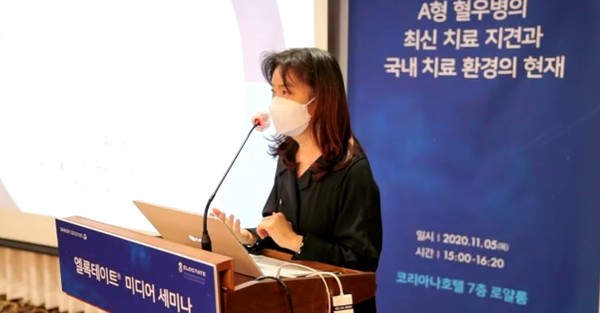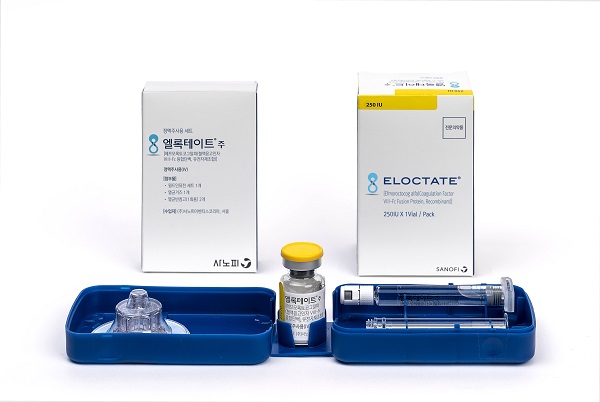Preventive treatment is most important for severe hemophilia patients, an expert said, noting that administrating recombinant factors only when patients bleed is no longer be considered a long-term treatment option.
Professor Choi Eun-jin of the Department of Pediatrics and Adolescents at the Daegu Catholic University made these and other points at a seminar on hemophilia treatment Eloctate, organized by Sanofi Genzyme, the special care unit of Sanofi Aventis.

At the seminar, Professor Choi introduced the latest therapeutic knowledge for hemophilia A and the domestic treatment environment, explaining the significance of the revised edition of the World Federation of Hemophilia Guidelines published in August 2020 and major clinical results of Eloctate, especially the importance of prophylaxis for hemophilia patients who suffer from random bleeding without injury.
Patients with severe hemophilia can only produce recombinant factors 8 and 9 less than 1 percent of the healthy people, which cause bleeding even without getting hurt, Choi said. Some patients bleed even with 3 percent of recombinant factor 8 due to individual differences in genetic propensities. For these patients, tailored treatment is needed.
Eloctate is the first genetically modified hemophilia therapy with an extended half-life of recombinant factor 8. The U.S. Food and Drug Administration approved Elocatate in June 2014, and the Ministry of Food and Drug Safety gave permit in August 2017.
Eloctate delays the hydrolysis of recombinant human factor VIII Fc (rFVIIIFc), induced by the lysosome through combining the factor 8 and Fc protein in the body, prolong the half-life of factor 8.

In the ASPIRE extension study, the half-life of Eloctate was 19 hours, extending 1.5 times longer compared to the standard half-life treatment.
In the ASPIRE, Eloctate was effective in patients of all ages, and there were no side effects related to neutralizing antibodies and treatment during the median period, 230 days.
The A-LONG study result showed that 233 of 235, or 99.18 percent, target joints in adult patients and target joints in all pediatric patients in the Kids A-LONG study, were resolved.
The patients' follow-up for more than six months has shown that the target joint's recurrence was found to be five percent in the adult patient group and zero percent in the pediatric group.
Continuous improvement of the joint condition was observed in hemophilia A patients treated with Eloctate prophylaxis until the second year of the ASPIRE study.
At the beginning of the A-LONG study, the most pronounced joint health improvement was found in the lower 25 percent of the modified Hemophilia Joint Health Score.
Of the 202 patients who underwent Eloctate prophylaxis, 190 maintained the dosage (within 80%-125% of the prescribed dose), and 192 of 202 maintained the dosing interval and showed high compliance.
“Some hemophilia patients even receive artificial joint surgery due to joint damage caused by a lack of administered drugs that lead to sudden bleeding,” Professor Choi said. “Patients are given more injections due to lacking dose, making me think a lot about what kind of therapy would help them with their lives.”

